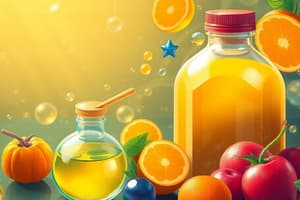Podcast
Questions and Answers
What is the primary function of antimicrobial preservatives?
What is the primary function of antimicrobial preservatives?
- To enhance flavor and aroma
- To improve the texture of food
- To prevent growth of bacteria and fungi (correct)
- To prolong shelf life through refrigeration
Which of the following is an example of an antioxidant used in food preservation?
Which of the following is an example of an antioxidant used in food preservation?
- BHA (correct)
- Benzoic acid
- Nitrates
- EDTA
What role do chelating agents play in food preservation?
What role do chelating agents play in food preservation?
- They bind to metal ions to prevent spoilage (correct)
- They act as natural colorants
- They enhance the taste of food
- They increase the fermentation process
Which of the following preservatives would be effective in preventing rancidity in fats?
Which of the following preservatives would be effective in preventing rancidity in fats?
Which type of preservative is primarily used to combat the spoilage caused by microorganisms?
Which type of preservative is primarily used to combat the spoilage caused by microorganisms?
What is the primary function of chemical preservatives in food production?
What is the primary function of chemical preservatives in food production?
Which of the following statements best describes the role of chemical preservatives?
Which of the following statements best describes the role of chemical preservatives?
Which of these is NOT a typical characteristic of chemical preservatives?
Which of these is NOT a typical characteristic of chemical preservatives?
What aspect of food preservation do regulations for chemical preservatives primarily address?
What aspect of food preservation do regulations for chemical preservatives primarily address?
Which potential benefit do chemical preservatives provide to the food industry?
Which potential benefit do chemical preservatives provide to the food industry?
What is the primary function of chemical preservatives in food?
What is the primary function of chemical preservatives in food?
Which of the following is NOT an example of a chemical preservative?
Which of the following is NOT an example of a chemical preservative?
What type of microorganisms do chemical preservatives prevent from growing?
What type of microorganisms do chemical preservatives prevent from growing?
Which statement best describes the purpose of chemical preservatives?
Which statement best describes the purpose of chemical preservatives?
Which of the following statements is true regarding the shelf life of food when chemical preservatives are used?
Which of the following statements is true regarding the shelf life of food when chemical preservatives are used?
Flashcards are hidden until you start studying
Study Notes
Chemical Preservatives in Food
- Chemical preservatives are substances added to food to prevent spoilage and extend shelf life.
- Their primary purpose is to inhibit the growth of microorganisms, such as bacteria, molds, and yeasts.
- Some common examples of chemical preservatives include sodium benzoate, potassium sorbate, and sulfur dioxide.
Types of Chemical Preservatives
- Antimicrobials: These preservatives prevent bacterial and fungal growth. Examples include nitrates, nitrites, and benzoic acid.
- Antioxidants: These preservatives prevent oxidation and rancidity. Examples include BHA (butylated hydroxyanisole), BHT (butylated hydroxytoluene), and ascorbic acid.
- Chelating Agents: These preservatives bind metal ions to prevent spoilage. A common example is EDTA (Ethylenediaminetetraacetic acid).
Studying That Suits You
Use AI to generate personalized quizzes and flashcards to suit your learning preferences.




